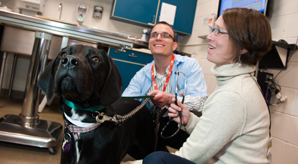

We offer many services to prevent disease and to optimize the health of your pet. Our most common services include:
Wellness Exams
Based on the American Animal Hospital Association Guidelines, we recommend for optimum health and wellness that all pets should have a veterinary examination at least annually. For many pets, more frequent visits may be appropriate. By evaluating factors such as age, breed, health and environment, we will discuss the recommended frequency of visits based on your pet's individual needs.
Exams for Minor Illness and Injury
There may come a time when your dog or cat is not feeling well and needs to be examined. We see pets with common problems such as itchy skin, vomiting, diarrhea, or limping. The Community Practice team will work together with you to help find answers and make treatment recommendations.
Vaccines
Regular vaccinations help prevent dangerous diseases such as rabies, parvo, and distemper, protecting your pets as well as your family. We divide our vaccines into what we consider "core" and "non-core".
Core vaccines are those that we feel every pet should have. They help protect against potentially deadly diseases that many pets are exposed to at some point in their life.
Non-core vaccines are those that we recommend based on your pet's lifestyle. Together, we will evaluate the best vaccine protocol for your pet.
Parasite Control:
Internal and external parasites can be a concern to both you and your pet. There are many ways to prevent disease from these microscopic and adaptive eggs and organisms, from oral medication to topical applications.
Common parasites we can help protect your pet from and treat in cases of infection include: fleas, ticks, ascarids, coccidian, heartworm, roundworms, hookworms, tapeworms, and whipworms
Signs of parasite infection can vary so it's important to discuss with your veterinarians any symptoms your pet is having. Some signs to watch for include:
Note: It is important to call and make an appointment if your pet is showing any of the above signs. In some cases there can be more than one cause for these symptoms.
In addition to parasite control medications, there are steps you can take to help decrease the risk of exposure for you, your family and your pets. View our owner care section to read more about safety against parasites, recommended by the Companion Animal Parasite Council and the Centers for Disease Control and Prevention.
Spay and Neuter:
Spaying and neutering your pet can improve your pet's health, as well as reduce the overpopulation of dogs and cats. Spays and neuter are completed on an inpatient basis, and we recommend spay and neuter are done once your pet is fully vaccinated (we like to wait at least two weeks after your pet's last vaccine, usually at about 4 1/2-5 months old).
Dental Care:
Our community practice service completes basic dental care and cleanings and can provide you information on home dental care. If your pet has advanced dental disease or dental issues, you will be referred to our Dentistry and Oral Surgery service.
Weight Management:
A healthy weight can help your pet live longer and have fewer health issues. Our veterinary students along with the Community Practice veterinarians can work with you to manage or improve the weight of your pet. Your pet's ideal weight can sometimes be hard to identify, so speak to the Community Practice about your pet's weight.
Senior Care:
Senior pets often need special care to maintain their health. For example, biannual (every six months) exams are important for identifying or managing the chronic problems that many older pets develop. We provide services such as baseline bloodwork, chest X-rays, and blood pressure readings to help monitor the health of your senior cat or dog. Our "Everyday Care for Your Pet" page can give you more information about caring for your senior pet.
Euthanasia:
Making a decision to help your companion animal die can be one of the most painful and difficult decisions you will ever make. Our Argus Institute and your veterinary team will help guide you through this difficult process with care and compassion.